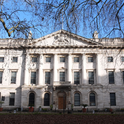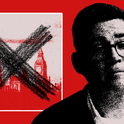The BBC hasn’t stopped talking about the death of a fondly regarded 96-year-old in a week. Of course Elizabeth II, who never complained and always showed up, was widely respected too. However predictable, the end of a 70-year reign could—potentially—have opened up sweeping questions about sort of the country we want to be and how we want to be run. Instead, we have gawped at buglers in gold brocade, listened to the Garter King of Arms pronounce Charles III “our only lawful and rightful liege lord,” and endured endless analysis of every quirk of the long-planned Operation London Bridge. The whole conversation has felt like a stultifyingly safe space.
The real feeling in large parts of the population has been moulded into contrived deference. Keir Starmer appears to have leaned on his shadow cabinet (about half have complied) to follow his lead in replacing their Twitter profile picture with a black void. Some things have been “debated,” but in ways which proactively discourage anyone else from saying anything the Palace wouldn’t want to hear. The Daily Mailfulminated indiscriminately against “woke liberals” who had stepped out of line, eliding ugly words from crass attention-seekers with the thoughtful reflections of the (far from “woke”) Harvard historian Maya Jasanoff.
It wasn’t in any British outlet but the New York Times that Jasanoff underlined Elizabeth’s “profound, sincere commitment to her duties,” before explaining how she had served as the reassuring face of a nation dissolving an Empire forged in blood. In a country that threw off the British Crown 250 years ago, as in so much else of the world, this is hardly controversial stuff. And yet there are forces in Britain that will not accept this can even be said.
Amid a proclamation of the new King in Oxford, a man was handcuffed and briefly arrested merely for asking: “who elected him?” A policeman harangued a London barrister for his identity because he was carrying a blank sheet of paper on which he was planning to write “not my King”—something the officer felt some people might find “offensive.” Two protesters have actually been charged for cruder interventions in and around the ceremonials in Scotland. In some of these cases the police may have got ahead of the law, but there are grey areas which make it hard to rein them in. Free expression rests on a shared understanding that it trumps any general right not to be offended, and that disruptive opinions are not automatically invalid. The last week has set us back on both counts.
Real feeling in large parts of the population has been moulded into contrived deference
We have grown used to thinking of the threat to free speech as emanating from the new “woke” puritans—with their zealous codes demarking how contentious issues can be discussed. Every so often, you really do hear a tale of a disturbing campus “cancellation,” a pathetically petrified publisher or a wrongheaded demand to remove a statue rooted in a muddle-up about the identity of its subject. But now comes a reminder that the most restrictive codes still come, not from any puritans, but the Royalist establishment.
Its codes do not just restrict speech. Various sports fixtures, the Last Night of the Proms and the Liberal Democrat party conference have all been cancelled. Like millions of parents, I found myself having to explain to my baffled eight-year-old why his weekend football match was off. The famously Keep Calm and Carry On reign has descended into a Break Down and Call It Off post-script.
But does this passing moment of monarchist fervour really matter? Won’t perspective and common sense be restored when the official mourning ends? If we want to debate our history or the constitution, can’t we just do it then?
No. The changing of the royal guard is a moment for discussion that cannot be missed. After all, for the last 15 or 20 years, questions about the monarchy have been brushed aside as something to be grappled with only after Elizabeth was gone. Now that she has, the fact of everything changing is being deployed to make sure that everything stays the same. No pause to draw breath or think is permitted: “The Queen is dead. Long live the King!”
A less inhibited discussion about the monarchy at this crossroads need not trash Elizabeth’s record; in some ways, it may set her reputation on a firmer footing. The British Empire truly was lucky to have at the helm in the years of its dissolution a woman who instinctively understood that her first duty was to sit on her hands. A raised eyebrow over decolonisation from a different head of state might have been enough to inspire trouble from elements in the armed forces and excitable League of Empire Loyalist types.
Nonetheless it was, to take one example, a governor appointed in the name of her Crown who answered the Mau Mau uprising in Kenya with a notoriously bloody seven-year state of emergency. The week when Elizabeth has passed on is surely as good a time as any to reflect on whether her heirs and successors should continue to—taking, again, just one example—dish out honours billed around the Order of the British Empire.
There may be something to the argument that reverence for a constitutional monarchy is a benign channel for human irrationality that could otherwise turn nasty; and indeed, the claim that a hereditary monarch who doesn’t have to jostle for position like everyone else is better placed to unify a country. All this is worth an airing.
But it is embarrassing to watch the same self-styled political moderates who in every other context avow an absolute commitment to equal life chances rationalise primogeniture at the Palace—a principle that excludes racial and religious minorities together with anyone else born outside a tiny elite. King Charles is blithely welcomed not by dint of who he is, but purely because of where he came from—as “having been prepared for this post throughout his whole life,” as if that, on its own, qualified him as the best person for the job.
It is surely worth pausing on that, and indeed on the thought that had biology or biography rendered Charles childless, his disgraced brother Andrew would just have become heir apparent. On such twists of fate hangs the whole “genius” of the system.
We should pause, too, on the myriad powers that lurk behind the throne, for others to use or abuse. As I set out in a Prospect cover piece last year, the Brexit debacle saw an unlawful move to shut down parliament with prerogative powers, as well as mumbled threats about withholding Royal Assent and the (separate) Queen’s Consent to make sure the government got its way.
Even now, we wait to see what horrors on Boris Johnson’s resignation honours list the Queen was forced to rubber-stamp in her very final days. There are whispers about the ennobling of his relatives—his brother was already handed a peerage, to smooth things over after an earlier row. Some predict lifetime seats in the Lords, too, for his stalwart allies in our supposedly fiercely free press. It could be a show of feudal arrogance that the Queen herself understood was ruled out by the spirit—if not the letter—of a constitutional monarchy. The moment of Elizabeth II’s passing makes it urgent to look again at all her powers and ask how they would fare in less restrained hands. To say this is not disrespectful but a tribute to the late Queen’s good sense. Let’s thrash it all out—and freely.












